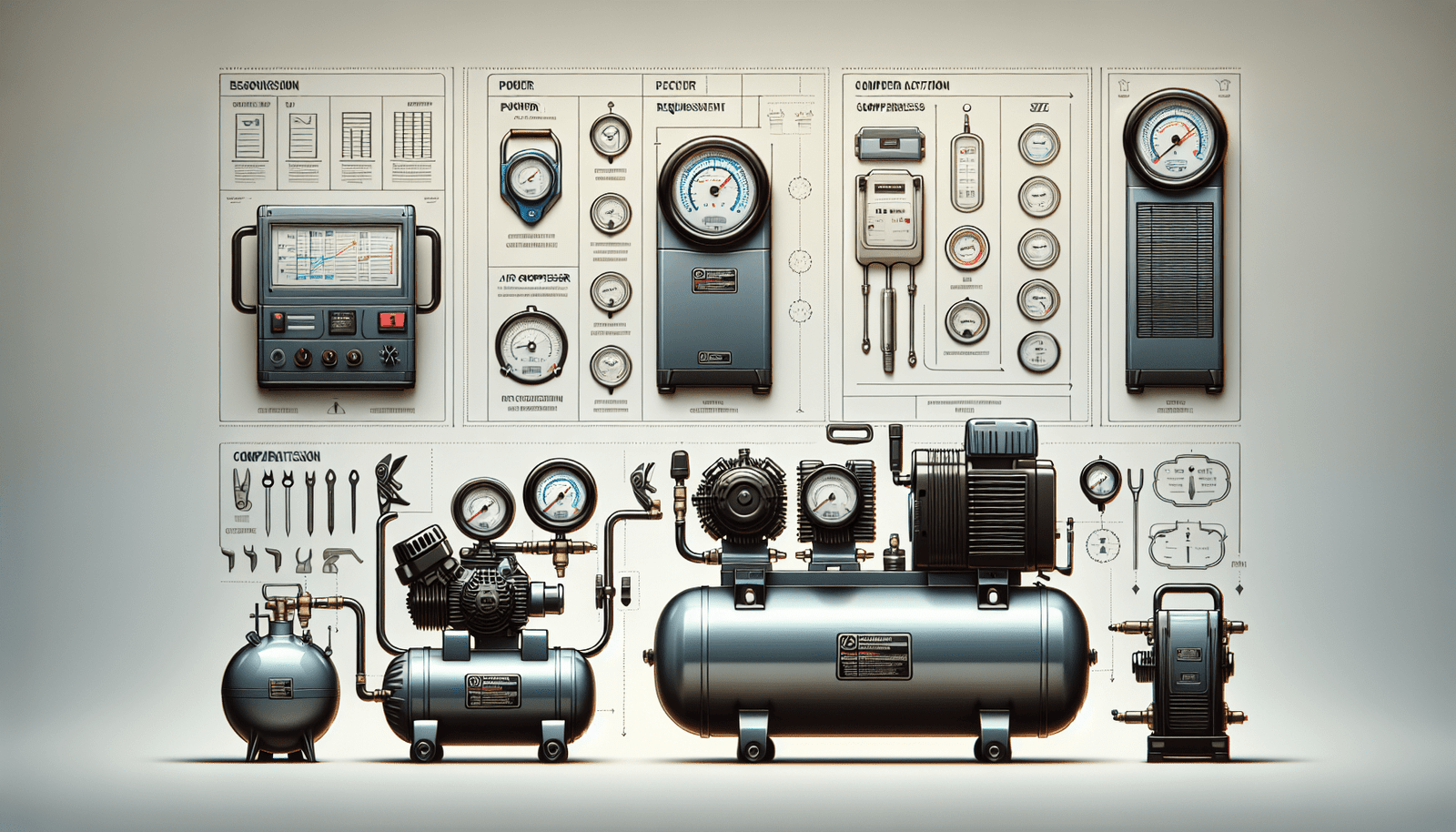Let’s face it: choosing the right air compressor can be quite overwhelming, especially with the multitude of options available in the market. But fear not, because in this article, we will guide you through the process and help you find the perfect air compressor that suits your specific needs. From understanding the different types and sizes of air compressors to considering the various features and factors that come into play, you’ll be equipped with all the information you need to make an informed decision. So, let’s get started on finding the ideal air compressor that will effortlessly power your projects and keep your tools running smoothly.

Consider Your Needs
Evaluate the Purpose of the Air Compressor
When choosing the right air compressor, it is important to first evaluate the purpose for which you will be using it. Are you planning to use it for home projects, industrial applications, or for professional use? Understanding the specific purpose will help determine the size, power, and features that are necessary for your needs.
Assess the Air Flow Requirements
To ensure that the air compressor meets your needs, it is essential to assess the air flow requirements of the tools or equipment you will be using. Take into consideration the required cubic feet per minute (CFM) and the pressure needed to operate your tools efficiently. By understanding these factors, you can choose a compressor that provides sufficient air flow for your specific applications.
Determine the Power Source
Consider the power source available in your intended location for using the air compressor. Air compressors can either be powered by electricity or gasoline. If you have access to electricity, an electric compressor may be more suitable. However, if you need to work in remote areas or do not have access to electricity, a gasoline-powered compressor might be the better choice. Determining the power source will help narrow down your options and ensure compatibility with your working environment.
Understand Compressor Types
Reciprocating Air Compressors
Reciprocating air compressors, also known as piston compressors, are widely used and suitable for various applications. They work by using pistons to compress air in a cylinder. These compressors are available in both single-stage and two-stage configurations. Single-stage compressors are generally more affordable and suitable for lighter duty applications, while two-stage compressors offer higher efficiency and are better suited for heavy-duty tasks. Reciprocating compressors are versatile, reliable, and ideal for smaller shops or personal use.
Rotary Screw Air Compressors
Rotary screw air compressors are designed for continuous use and are more commonly used in industrial settings. These compressors utilize a rotary screw mechanism to compress air. They are known for their efficiency, reliability, and quiet operation. Rotary screw compressors are available in either oil-injected or oil-free models, with oil-injected models offering slightly higher performance. These compressors are highly durable and are capable of delivering a consistent flow of compressed air for extended periods.
Centrifugal Air Compressors
Centrifugal air compressors are typically used in large-scale industrial applications that require high volumes of compressed air. These compressors work by using an impeller to accelerate and compress air. Centrifugal compressors are known for their high efficiency and ability to deliver large amounts of air at high pressures. Due to their complexity and high upfront cost, they are primarily used in specialized industries that demand significant air compression capabilities.
Consider Tank Size
Evaluate the Intended Use
The tank size of an air compressor is an important factor to consider as it determines the amount of compressed air that can be stored and used. Evaluating the intended use of the air compressor will help determine the appropriate tank size for your needs. If you plan on using the compressor for short bursts of work, a smaller tank may be sufficient. However, if you require a continuous supply of compressed air for longer durations, a larger tank will be more suitable to avoid frequent interruptions for the compressor to refill.
Determine the Required Storage Capacity
When choosing an air compressor, it is crucial to determine the required storage capacity of the tank. This will depend on the nature of your projects and the tools you intend to use. Tools that require a higher volume or longer periods of compressed air will benefit from a larger tank size. On the other hand, tools with lower air consumption rates may be adequately served by a smaller tank. By considering the required storage capacity, you can ensure that your air compressor meets the demands of your specific applications.
Check Maximum Pressure
Assess the Pressure Requirements of Your Tools
Different tools and equipment have varying pressure requirements to operate efficiently. The maximum pressure rating of an air compressor determines its ability to provide sufficient pressure to power your tools. Before making a purchase, assess the pressure requirements of the tools you will be using. Ensure that the compressor you choose can deliver the necessary pressure without straining its capabilities.
Consider Future Needs
While assessing the pressure requirements of your current tools is important, it is equally crucial to consider potential future needs. If you plan on acquiring additional tools or upgrading to more powerful equipment in the future, it is wise to choose an air compressor with a higher maximum pressure rating. This will allow you to adapt to changing needs without needing to invest in a new compressor down the line.

Assess Horsepower
Evaluate the Power Requirements of Your Tools
The horsepower (HP) rating of an air compressor indicates its power output and determines its ability to run specific tools. Evaluate the power requirements of the tools you intend to use to ensure compatibility with the air compressor you choose. Tools with higher horsepower ratings will necessitate a compressor with a correspondingly higher horsepower capacity to operate effectively.
Consider Efficiency and Performance
While it may be tempting to simply choose the highest horsepower compressor available, it is essential to consider the efficiency and performance of the unit. A higher horsepower does not always equate to better performance, as factors such as compressor design, air flow, and motor efficiency play significant roles. Opt for a compressor that balances power output with efficiency to ensure optimal performance and longevity.
Evaluate Duty Cycle
Determine the Frequency of Use
The duty cycle of an air compressor refers to the amount of time it can be operated within a given time period without overheating. Assess the frequency of use for your air compressor to determine the duty cycle that will be suitable for your needs. If you plan on using the compressor for extended periods, such as in industrial settings, it is crucial to choose a compressor with a high-duty cycle to prevent overheating and ensure continuous operation.
Consider the Heat Dissipation Ability
Air compressors generate heat during operation, and the ability to dissipate heat effectively is crucial to prevent damage and prolong the life of the unit. Evaluate the heat dissipation ability of the compressor you are considering to ensure that it is adequate for your intended usage. Compressors equipped with efficient cooling systems or built-in thermal protection mechanisms are preferable, especially for applications that involve prolonged use.
Consider Noise Level
Assess the Environment and Noise Restrictions
When choosing an air compressor, it is vital to consider the noise level it produces, especially if you will be working in an environment with noise restrictions. Assess the environment in which you will be using the compressor and determine if any limitations on noise levels are in place. Some compressors are specifically designed for quieter operation, making them more suitable for settings where noise control is crucial.
Choose a Compressor with Lower Decibel Rating
To ensure a more comfortable and quieter working environment, opt for an air compressor with a lower decibel rating. Compressors with noise reduction features, such as insulated cabinets or vibration-dampening materials, can significantly decrease noise levels. By choosing a compressor with a lower decibel rating, you can minimize noise disruption and maintain a more peaceful workspace.
Check Portability and Space
Evaluate the Portability Requirements
Consider the portability requirements of your air compressor, as this will dictate the level of mobility you need. If you plan on frequently moving the compressor from one location to another, prioritize models that are lightweight and equipped with handles or wheels for easy transportation. However, if you intend to install the compressor in a fixed location, portability may be less of a concern.
Consider the Available Space for Installation
Assess the available space in your workshop or working area to determine the appropriate size and configuration of the air compressor. Measure the dimensions of the area where the compressor will be installed and consider any space limitations or restrictions. While larger compressors may offer greater capacity, they require more floor space. Finding a balance between size, capacity, and available space will help ensure a suitable fit for your needs.
Consider Additional Features
Evaluate Safety Features
Safety should be a top priority when selecting an air compressor. Evaluate the safety features offered by different models to ensure your safety and the protection of those around you. Features such as automatic shut-off systems, pressure relief valves, and thermal overload protection can provide added peace of mind during operation.
Check for Air Dryer and Filters
Depending on your specific applications, it may be beneficial to choose an air compressor that includes an air dryer and filters. Air dryers remove moisture from the compressed air, preventing potential damage to tools and equipment. Filters help remove contaminants, ensuring clean and reliable air supply. Considering these features can significantly improve the overall performance and longevity of your compressor.
Consider Oil-free Operation
If you require clean and oil-free compressed air, consider choosing an air compressor that operates without oil. Oil-free compressors eliminate the need for oil lubrication, reducing maintenance requirements and the risk of oil contamination in the compressed air. This is particularly important for applications that involve sensitive equipment or environments where oil-free air is essential.
Set a Budget
Determine Your Price Range
Before beginning your search for the right air compressor, determine your price range or budget. Air compressors come in a wide range of prices, so having a predetermined budget will help narrow down your options. Consider how much you are willing to invest in a quality air compressor that meets your needs and offers the desired features.
Consider Long-term Cost of Ownership
While the upfront cost of an air compressor is important, it is equally crucial to consider the long-term cost of ownership. Take into account factors such as maintenance, energy consumption, and potential repairs when evaluating the overall cost. A higher-quality and more efficient compressor may have a slightly higher upfront cost but can save you money in the long run through reduced maintenance and energy expenses.
Choosing the right air compressor for your needs involves considering various factors such as the purpose, air flow requirements, power source, compressor types, tank size, maximum pressure, horsepower, duty cycle, noise level, portability, additional features, and budget. By carefully evaluating each aspect and considering your specific requirements, you can make an informed decision and select an air compressor that will effectively meet your needs for years to come.

